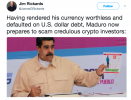High on the news of Bitcoin prices, you may not have noticed that Venezuela just announced it will be launching its own “cryptocurrency”. According to Reuters, Venezuelan President Nicolas Maduro made the announcement on his weekly national TV program Sundays with Maduro on December 3, 2017. The new currency will be called petromoneda or simply the “petro”.
This is big news and makes Venezuela the first country to float a cryptocurrency backed by its natural resources. Crypto has long been touted as a solution for countries with unsteady economies and the “unbanked”, and in this sense, Venezuela certainly fits the bill.
A Brief History of Venezuela
If you don’t know what’s happening in Venezuela, here’s the situation in a nutshell: the country hovers on the edge of a civil war, its GDP has all but collapsed, political instability reigns, and it is the most indebted country in the world.
Amid this tragic social and economic crisis, the Venezuelan bolivar has also lost almost all of its value against the US dollar. Many Venezuelans have been plunged into poverty as a result and the country continues to suffer from extreme hyperinflation.
To make matters worse, the United States recently levied additional sanctions. The introduction of the petro is seen by some as a clever attempt to shore up a sputtering monetary system and a method of circumventing US penalties. To others, it’s a hail mary play that won’t work.
But the truth may be that the government is just arriving at a party that many tech-savvy Venezuelans are already at. Venezuela is an early case study of a country adopting crypto (in this case, BTC) out of necessity. As the crisis spiraled out of control, many Venezuelans started to turn to Bitcoin and placed more trust in the decentralized currency than their native Bolívar.
Bitcoin mining is also more lucrative in Venezuela due to subsidized energy costs, and it’s become popular recently despite being illegal. It is estimated that “tens of thousands of people mine bitcoin to protect themselves from inflation — set to surpass 2,300 percent in 2018.”
A glimpse into the future, perhaps.
The Petro
This new coin will be backed by government-held oil, gas, gold, and diamond reserves, making it something akin to the US dollar on the gold standard. Here is the official government line:
Venezuela will create a cryptocurrency to advance monetary sovereignty, as it will help to overcome the financial blockade and thus move towards new forms of international financing for the economic and social development of the country.
You can see Maduro’s thinking; he wants to tap into some of the success that cryptocurrency has been enjoying and needs a way to move capital around sanctions.
The news immediately caused a split in opinion and debate erupted. To use the words of one Reddit commentator, “I believe it to be a fairly sensible move for a government struggling with hyperinflation: a currency backed by global-market commodities is unlikely to see much price fluctuation.”
These sentiments were echoed by well-known cryptocurrency expert Max Keiser:

But quite predictably detractors also emerged en masse to criticize the action.
“It’s Maduro being a clown,” opposition lawmaker and economist Angel Alvarado told Reuters. “This has no credibility.”
NYT bestselling author James Rickards followed up with this rejoinder:

Specific details were not forthcoming on how the currency would actually function. Some speculated that it may not even come to fruition and was more of a diversionary tactic. There was also no word as to the ratio at which the petro would get pegged to oil or any other commodity. Given the fact that it is not truly decentralized, the designation “cryptocurrency” is likely not even accurate.
One of the defining (and most alluring) features of cryptocurrency is that they are not issued by any central authority. In this way, there is very little that is “crypto” about this. It’s more of a promissory note. It can be accounted for using blockchain or just treated as a conventional bond.
For a country with a terrible fiat currency track record, getting people to buy in (cryptocurrency or not) will also be difficult.
For those concerned about the purity of blockchain’s promise, big questions remain. Will the Petro have reversible transactions? Who exactly will control the decision making power of the network? Will the code be open-source? Will transactions be private?
The Venezuelan government did announce the establishment of a blockchain observatory “to provide an institutional, political and legal base to the new currency”. But again, details on this were relatively hazy and trust is weak, to say the least.
This announcement comes roughly one year on from another Maduro-led approach to address rampant inflation rates: pulling Venezuela’s previously very popular 100-bolivar note from circulation and replacing it with a 500-bolivar note. This particular action led to violent protests and looting that ended up being so problematic, the government stalled their plans.
Perhaps not the best footnote for a man looking for confidence in a newly-introduced currency.
Final Thoughts
Not long ago, NPR called Venezuela “an economic horror story about a country that made all the wrong decisions with its oil money.”
Unfortunately, the odds of the petro improving the lives of ordinary Venezuelans is small in the short-term. There will likely be continued struggles with hyperinflation, food shortages and access to basic services.
While the petro may not be the magic bullet that Venezuela desperately needs, it does provide an interesting early example of a government-led foray into cryptocurrency. As crypto continues to go mainstream, we can expect more of this to happen.

